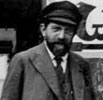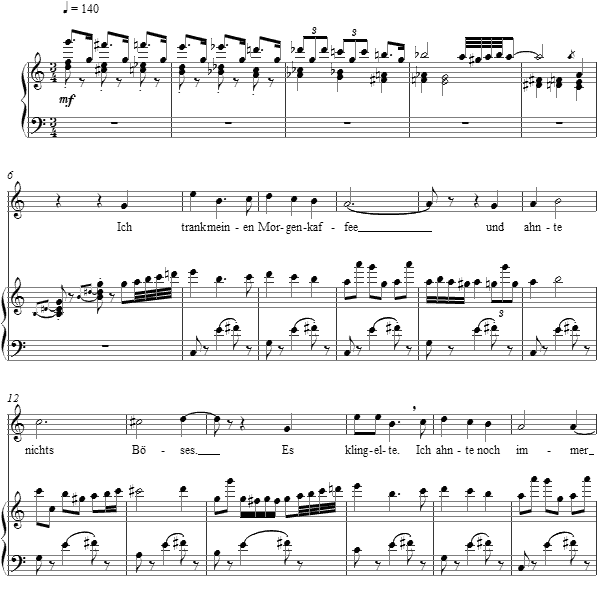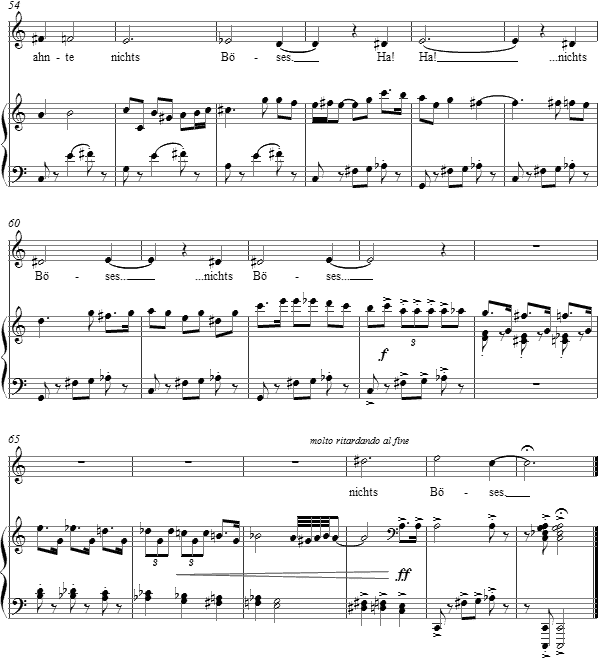Music and Texts of GARY BACHLUND
Vocal Music | Piano | Organ | Chamber Music | Orchestral | Articles and Commentary | Poems and Stories | Miscellany | FAQs
Die Ahnung - (2010)
Erich Kurt Mühsam
for medium voice and piano
Ich trank meinen Morgenkaffee und ahnte nichts Böses.
Es klingelte. Ich ahnte noch immer nichts Böses.
Der Briefträger brachte mir ein Schreiben. Nichts Böses ahnend, öffnete ich es.
Es stand nichts Böses darin.
Ha! rief ich aus. Meine Ahnung hat mich nicht betrogen.[ 3 pages, circa 1' 35" ]
Erich Mühsam
The Premonition
I drank my morning coffee and felt no horrid premonition.
The doorbell rang. I felt still no approaching evil.
The postman brought me a letter. Feeling no trepidation, I opened it.
There was nothing horrible therein.
"Ha," I cried aloud. My hunches had not deceived me.
gb
The text is most often associated with Mühsam's more humorous side, though I chose not to observe this. He was a political animal, known in that time as a Communist anarchist but of the period. For this, his writings reveal -- as do many of that time-- a confusion between terms in the sea of political turmoil between the two World Wars. The Berliner Mühsam wrote clearly about freedom, and specifically freedom from the state, which in that time was seen as best arrived at in his circle through Communist anarchy.
Oddly, this confusion of terms as seen in much of his prose may be revisited in our era with a new clarity, for he would have stood against the tyranny of all political parties, ostensibly right and left. For myself and with the perspective of a century of "right-left" postulations, I reject the image of politics as "right" versus "left," per se, and rather cluster politics into that which encourages more invasive, expensive government as set against that which advocates for more limited and less invasive government. For this, I rely on George Washington's warning in his speech of 1796, telling the truth that allegiance to party too often trumps allegiance to other social entities, such as family, contract and moral law.
It is reported that Mühsam died horridly in the Oranienburg concentration camp in 1934. Reports of his torture and death include his Nazi captors forcing him to sing the Horst-Wessel-Lied [ 1 ], and for this "Böse" a light-hearted setting of the text's "no horrid premonition" turns by degree away from the seeming nonsense of the poem to the serious and insane "non-sense" which was his tortured demise at the hand of the National Socialists.
The opening of the song drifts lower in a sweep of half steps, to give way to a sweet waltz, the accompaniment's raised fourth lightening the mood.
The repetition of "nothing horrid" and the laugh continues now in the lower tessitura, as above it a thin parody of only a portion of the Horst-Wessel-Lied's duple meter melody attempts to find a place within the dominant triple meter of the setting. It fails, and a louder repetition of the setting's opening gesture is sung out in a lower octave, its chromatic descent leading to underpin a last and now utterly deceitful reading of "nichts Böses."
The last fortissimo slap of the tonic minor becomes the dreaded knock on a door as the thugs came to arrest him for crimes against the "state," such as it was in that historical time. [ 2 ]
The score for Die Ahnung is available as a free PDF download, though any major commercial performance or recording of the work is prohibited without prior arrangement with the composer. Click on the graphic below for this piano-vocal score.
NOTES
[ 1 ] The Horst-Wessel-Lied was essentially a reworking of an older WWI melody to a nationalist text written in 1929 by Horst Wessel. Die Fahne hoch ("Raise the flag") was its alternative name.
The National Socialists turned the lyrics of a commander of the SA (Sturmabteilung) in the Friedrichshain district of Berlin into a co-equal national anthem with the first stanza of the Deutschlandlied. Wessel was a thug, murdered in a private altercation in 1930 and made into a martyr for the Nazi political cause by Joseph Goebbels; Wessel's funeral was a state affair, but after the war, his grave was emptied and the body destroyed by the DDR government of the East.
In addition, because the song had been officially recognized as a national symbol by a law on May 19, 1933, today the song lyrics are prohibited by law in Germany. (Criminal Code (Strafgesetzbuch, StGB) As promulgated on 13 November 1998 (Federal Law Gazette I, p. 945, p. 3322). Title Three - Endangering The Democratic Rule of Law, Section 86 - Dissemination of Means of Propaganda of Unconstitutional Organizations.) Ironically, the SA which Wessel celebrated in his banal lyrics was purged in Hitler's Night of the Long Knives - June 29-30, 1934.
The odd confluence of Horst Wessel being made first a martyr through propaganda, and then the organization with which he was affiliated being purged while justified through other propaganda, is set off against the poetry of Erich Mühsam. Today this poetry may be spoken aloud, while the empty sloganeering of a Wessel is still purged, if by other means and rationale.
Mühsam's light statement on "premonition" and my take on the same sort of premonition taken in several generations' retrospect suggests the truth of Edmund Burke's observation about politics and sloganeering: "It is an advantage to all narrow wisdom and narrow morals that their maxims have a plausible air; and, on a cursory view, appear equal to first principles. They are light and portable. They are as current as copper coin; and about as valuable. They serve equally the first capacities and the lowest; and they are, at least, as useful to the worst men as to the best. Of this stamp is the cant of not man, but measures; a sort of charm by which many people get loose from every honourable engagement." As found in Thoughts on the cause of the present discontents, 1770.
Mühsam's poem is not narrow wisdom, but in my reading a warning to us that some premonitions turn out to be of life-preserving value, and Mühsam's "Ahnung" was in fact the reality which he was shortly to experience at the hands of the "worst of men." For this, his bit of nonsense poetry is most assuredly not nonsense, but should be seen as a warning.
[ 2 ] Mühsam's journal founded in 1926 was titled Fanal, or "Torch." In it one finds very clearly that Mühsam, while enamored of the Communist sloganeering of that era, was very much against "the state."
One portion of his writing is titled, "Staatsverneinung" meaning rejection of that government which would infringe on personal freedom, as much of the history of twentieth century socialism ended up proven to have done. In a section subtitled, "Die Freiheit als gesellschaftliches Prinzip" or "freedom as the social principle," he specifically write, "...die Sehnsucht nach individueller Freiheit in der menschlichen Natur selber begründet ist."
That is, he agrees with even such documents as the new nation of Germany and the founding documents of the United States reveal, that "the urge to individual freedom in grounded in the nature of man himself."
Against this "nature of man himself" are the generations of thugs who would erode individual freedom.
For this, I argue with certainty that Mühsam, the anarchist and Communist of his day (those terms being slogans, per Burke's observation above, actually would have become victim of not only a Nazi regime, but others like Stalin's or Mao's, Pol Pot's or Kim Il-Jong's, Fidel Castro's or Hugo Chavez', because to base one's political philosophy on personal freedom and the advocate against the "state" (Staatsverneinung) is to become a dangerous enemy to the aggrandizement of political power and wealth in the hands of the few, each a dictator relying on the "light and portable" charade of Marx's "dictatorship of the proletariat."


